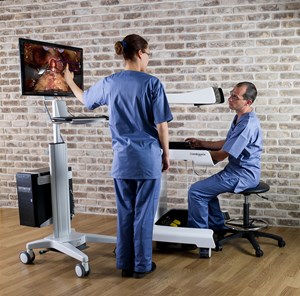May 18 2015
3D Systems announced today the release of a virtual reality robotic prostatectomy training module and 3D printed soft tissue models that will assist urologists in the training and planning of robotic procedures. 3DS' anatomical 3D printed models and the RobotiX Mentor's new Prostatectomy Module will be showcased at the Annual Meeting for the American Urological Association (AUA), May 15 - 19, 2015 in New Orleans in booth #953.

It is estimated that 1 out of 7 men will be diagnosed with prostate cancer in his lifetime and over 220,000 in the United States will be diagnosed with the disease in 2015 alone.1 Radical Prostatectomy, the surgical removal of the entire prostate gland, is a common procedure for those with localized prostate cancer.
The National Cancer Institute reports that 80% of the prostatectomy procedures in the United States are performed using the Robotic Assisted Radical Prostatectomy (RARP) technique2. This relatively new minimally invasive procedure is complicated, leading to a growing need for a comprehensive training solution on the robotic technology and procedural steps.
The unique Robotic Prostatectomy training module offered on 3DS' RobotiX Mentor provides the trainee with the opportunity to practice prostatectomy in a novel virtual reality surrounding. The module includes step-by-step procedural guidance, video-based curriculum for the entire procedure and performance metrics, and anatomy recognition. Click here to see the module in action. An optional team training component incorporates the LAP Mentor Express simulator to provide hands-on training for the laparoscopic assistant who plays a key role during the procedure.
"The addition of the Prostatectomy Module changes the future of Robotic Urology training," said Ran Bronstein, Vice President, Chief Technology Officer, Healthcare, 3DS. "3D Systems is committed to supporting medical advancements that ultimately affect patient safety by providing innovative products that range from virtual reality training systems to patient-specific soft tissue 3D printed models."
As methods for patient-specific treatment are becoming more common, 3DS continues to enhance its proprietary digital thread for personalized surgery. The company has recently partnered with surgeons at Tulane University School of Medicine to develop 3D printed soft tissue models which can be used for medical education, pre-surgical planning and pre-operative rehearsal. These models are created using a patient's medical imaging data to print in 3D on a multi-material printer, resulting in a model that is soft and flexible, much like a real kidney.
"Individualized patient-specific soft tissue 3D printing allows surgeons and trainees the opportunity to operate on a model that looks and feels just like their patient's kidney tumor," commented Dr. Jonathan Silberstein, Assistant Professor of Urology, Chief, Section of Urologic Oncology, Tulane University School of Medicine. "This technology has the potential to reinvent the way we teach and train our young surgeons and for experienced surgeons adapting to a new technology such as robotics, it will flatten the learning curve."
These true-to-life models can also be used for the benefit of the patient as they may be held in the hands of the patient while a surgeon educates them on their condition and planned procedure. Watch this video to see how 3DS is taking a leap into soft tissue modeling.
Learn more about 3DS' commitment to manufacturing the future today at www.3dsystems.com.